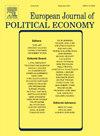财富不平等与大型活动
IF 2.4
3区 经济学
Q2 ECONOMICS
引用次数: 0
摘要
国家内部和国家之间的财富不平等正在加剧,促使采取各种干预措施来解决这一问题。在这种情况下,一些国家的政府可能会将举办大型活动视为一个机会,通过直接的长期投资来创造经济和社会效益,并与该地区的其他国家接轨。然而,这些耗资巨大的活动对财富不平等的影响可能是有害的,这取决于现有分配渠道的质量。本文旨在了解特大事件在解决财富不平等问题方面的潜在作用。我们以实证方法检验了 120 多个国家的体育盛事对财富不平等的影响。通过对可追溯到 1900 年的综合数据集进行面板数据分析,我们发现,举办奥运会、国际足联世界杯和世界博览会等大型赛事与 1%和 10%最富裕阶层财富份额的增加有关,而这往往是以 50%最贫穷阶层的财富份额为代价的。在非民主国家和非经合组织国家,这种影响的程度加倍,在举办国际足联世界杯期间,这种影响也更大。我们对这一现象提出了两种可能的解释:一是在组织大型活动期间出现的极端增长,使最富有的人不成比例地受益;二是与组织此类活动相关的既得利益。在不同的模型规格下,我们的结果仍然具有统计意义。本文章由计算机程序翻译,如有差异,请以英文原文为准。
Wealth inequality and mega events
Wealth inequality, both within and between countries, is on the rise, prompting various interventions to address this issue. In this context, some governments could perceive hosting mega events as an opportunity to generate economic and social benefits through directed long-lasting investments and to converge with other countries in the region. However, the impact of these costly events on wealth inequality could be detrimental, depending on the quality of existing distribution channels. This paper aims to understand the potential role of mega events in addressing wealth inequality. We empirically test the impact of sports mega events on wealth inequality across more than 120 countries. Utilizing panel data analysis on a comprehensive dataset dating back to 1900, we find that hosting mega events such as the Olympic Games, FIFA World Cups, and Universal Expositions is associated with an increase in the wealth shares of the top 1% and 10%, often at the expense of the bottom 50%. This effect is double in magnitude in non-democracies and non-OECD countries, as well as higher during the organization of FIFA World Cups. We propose two possible explanations for this phenomenon: episodes of extreme growth during the organization of mega events that disproportionately benefit the wealthiest individuals, and vested interests associated with the organization of such events. Our results remain statistically significant under various model specifications.
求助全文
通过发布文献求助,成功后即可免费获取论文全文。
去求助
来源期刊

European Journal of Political Economy
Multiple-
CiteScore
3.40
自引率
10.00%
发文量
106
期刊介绍:
The aim of the European Journal of Political Economy is to disseminate original theoretical and empirical research on economic phenomena within a scope that encompasses collective decision making, political behavior, and the role of institutions. Contributions are invited from the international community of researchers. Manuscripts must be published in English. Starting 2008, the European Journal of Political Economy is indexed in the Social Sciences Citation Index published by Thomson Scientific (formerly ISI).
 求助内容:
求助内容: 应助结果提醒方式:
应助结果提醒方式:


